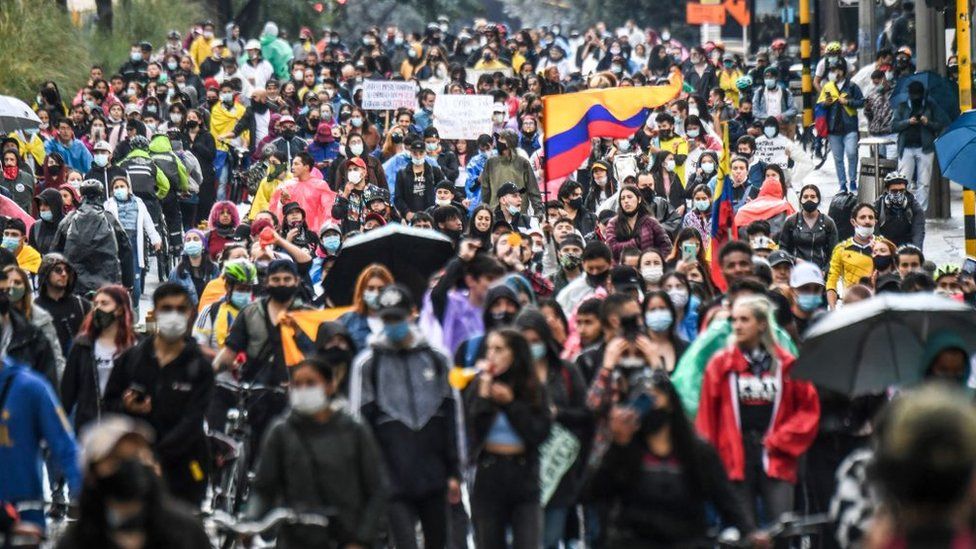Updates & Press
Featured | May 7, 2021
Weekly Humanitarian News Digest – May 7
Author | MedGlobalComms

Each week, we highlight the latest news related to the humanitarian and health crises in our countries of operation: Bangladesh/ Myanmar, Colombia/ Venezuela, Gaza/ Palestinian Territories, Lebanon, Pakistan, Sudan, Syria, and Yemen. For more frequent updates, make sure to follow us on Facebook, Instagram, and Twitter.
Cover Image: AFP
Latest News for April 30 – May 7, 2021
Bangladesh/ Myanmar
Bangladesh is postponing COVID-19 vaccinations for Rohingya refugees until it begins receiving shipments from COVAX. Vaccinations for 130,000 refugees were originally planned to begin on March 27, but were canceled after the disruption of vaccine imports from India due to the latter’s growing COVID-19 crisis. India was expected to produce 70% of vaccines for COVAX in the first half of 2021, including 10 million doses that would have gone to Bangladesh by the end of May. There have only been 570 confirmed cases of COVID-19 among refugees since the pandemic began, but infections and hospitalizations are rising in the surrounding communities. (The New Humanitarian)
Colombia/ Venezuela
Hundreds of people have been injured, dozens are missings, and at least 24 have died during week-long protests across Colombia. Protests were initially sparked over proposed tax reforms, but have become a broader movement against the government’s handling of the pandemic and economic crisis. Nearly half of Colombia’s population now lives in poverty. (BBC News)
Gaza/ Palestinian Territories
In April, Gaza recorded 35,882 new cases of COVID-19 and a 58% increase in active cases. Health officials reported 288 deaths in April, up from only 28 in March, bringing the total number of deaths in Gaza to 899. The positivity rate for COVID-19 tests during the last week of the month was 30%. Currently, 44 out of Gaza’s 77 intensive care unit beds are occupied. Only 36,496 people in Gaza are vaccinated, including 25,746 who have received two doses. (UN OCHA)
Lebanon
Lebanon may cease generating electricity this month due to fuel shortages caused by the economic crisis. Lebanon’s currency has lost 90% of its value against the dollar, making it increasingly difficult to finance basic imports. In March, Lebanon’s parliament approved a $200 million emergency loan for fuel imports, but the country’s constitutional committee has yet to approve it. Hours-long power cuts are already a common occurrence in the capital and other areas. (Reuters)
Pakistan
Pakistan is implementing new border restrictions, including banning all travel from India, as part of its strategy to manage its most recent wave of infections. Pakistan has reported 830,000 infections and more than 18,000 deaths from COVID-19 since the pandemic began. The UK variant of COVID-19 is currently the cause of most new infections, but the highly contagious variants from Brazil and South Africa have also been detected recently. Pakistan began vaccinating its population in February, but has only administered doses to 2 million out of 220 million people, the lowest rate in South Asia. (Voice of America News)
Sudan
Sudan is experiencing multiple health crises as it grapples with a third wave of COVID-19 infections. The Ministry of Health reported 138 new cases and five deaths over a three-day period. Local health systems continue to face regular attacks against health workers and suffer from shortages of oxygen and hospital beds. Sudan’s financial crisis has also halted imports of critical medications, causing severe shortages in medications needed for the treatment of cancer, kidney diseases, heart problems, and diabetes. (Radio Dabanga)
Syria
A new wave of COVID-19 infections is impacting northeast Syria amid shortages of testing equipment and oxygen supplies. As of April 26, there have been at least 15,000 cases, including 960 health workers, and 640 deaths. Hospitals in the region lack the capacity to handle the number of cases and there is limited personal protective equipment for medical staff. Two treatment centers have suspended operations due to shortages and the only laboratory processing tests are expected to run out of supplies in the next two weeks. (Voice of America)
Yemen
Widespread flooding across Yemen has killed at least seven people and affected more than 3,700 families. Heavy rains and flash floods in the Aden, Abyan, Daleh, Lahj, Hadramawt, Marib and Taiz governorates have caused extensive damage to infrastructure, homes, and shelters. The majority of people who have been impacted were already internally displaced. (France 24)
Yemen’s vaccination campaign is struggling to overcome vaccine hesitancy and barriers to access as cases continue to rise. Yemen received 360,000 COVID-19 vaccines through the COVAX program, but a fragile health system, vaccine hesitancy, and Yemen’s ongoing conflict have derailed rollout efforts. In Taiz, which has received 70,000 doses, only 500 have been administered over the past two weeks. According to health workers, the month of Ramadan has also hindered vaccinations as many Yemenis believe receiving a vaccine would break their fast. (Reuters)


